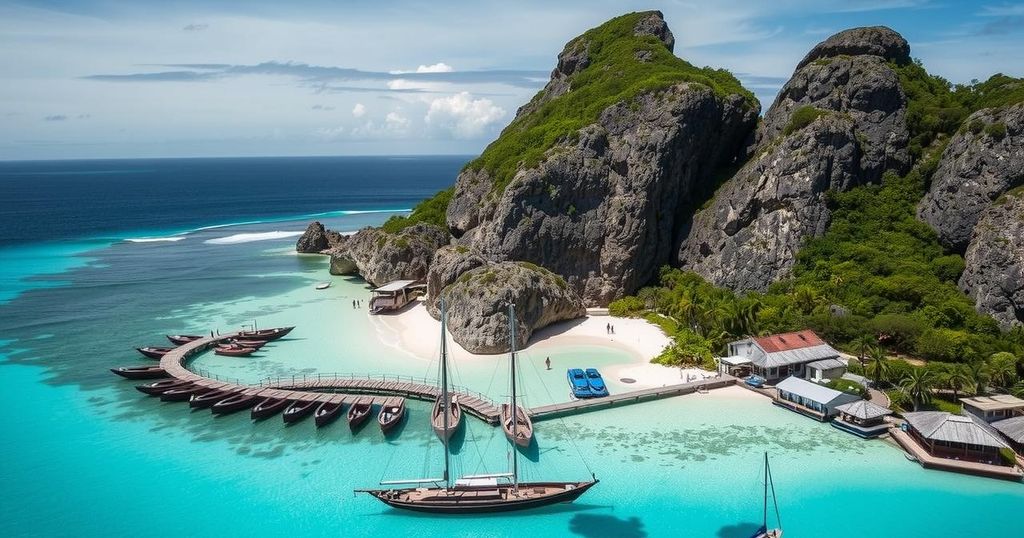Mauritius is seeking to renegotiate a deal with the UK regarding the Chagos Islands after elections introduced a new government. The initial agreement, formed in October 2024, proposed transferring sovereignty to Mauritius while retaining UK control over Diego Garcia for military use, a point of contention for Chagossians. The negotiations, criticized for excluding the voices of Chagossians, highlight ongoing issues related to colonial legacies and human rights.
The negotiations between Mauritius and the United Kingdom regarding the sovereignty of the Chagos Islands in the Indian Ocean are undergoing a significant reassessment. Although an agreement was reached in October, no formal documentation was signed. Following the November elections which brought Prime Minister Navin Ramgoolam to power, a review of the deal was ordered due to concerns that it would not yield the anticipated benefits for Mauritius.
The Chagos Islands, which form a British Indian Ocean Territory established in 1965, had been under British colonial administration alongside Mauritius. Upon gaining independence in 1968, Mauritius lost control over Chagos, which allowed for the establishment of a U.S. military base on the island of Diego Garcia, leading to the forced expulsion of approximately 2,000 Chagossians from their homes.
Mauritius has contested British sovereignty over the islands at the International Court of Justice (ICJ), which delivered an advisory opinion favoring Mauritius in 2019. Despite this, the UK had continued to assert its control until its announcement in October 2024, which indicated a willingness to transfer sovereignty to Mauritius, while retaining jurisdiction over Diego Garcia for military operations for an initial term of 99 years. This ongoing U.K. control is viewed by many Chagossians as a betrayal of their rights and claims.
Key voices within the Chagossian community, such as Bernadette Dugasse, express dissatisfaction with the lack of representation in the negotiations, challenging the idea that they are not recognized as a state. Olivier Bancoult, leader of the Chagos Refugees Group, indicated support for Mauritius’ position but noted they had been excluded from direct discussions.
Concerning maritime protections, the uncertainty surrounding the Chagos marine protected area, established in 2010, remains a contentious issue, as it has been perceived as an obstruction to Chagossians returning to their traditional fishing grounds. The subsequent agreement aims to establish a Mauritian marine protected area as well.
A joint statement released on December 20 affirmed the commitment of both the UK and Mauritius to finalize a treaty that ensures Mauritius’s sovereignty over the Chagos Archipelago while securing the operational effectiveness of the U.S. base at Diego Garcia. However, the Mauritian governmental office has yet to issue a response to inquiries regarding the current state of negotiations.
Mauritius has long contested British control over the Chagos Islands, which were forcibly separated from it during the creation of the British Indian Ocean Territory in 1965. This territorial dispute is rooted in historical injustices, including the displacement of the Chagossian people. Following decades of advocacy and legal battles, the ICJ’s advisory opinion in 2019 marked a significant moment for Mauritius’s claim. The agreement reached in October 2024, which proposed a cession of sovereignty to Mauritius while maintaining British military presence, has sparked renewed debate and dissatisfaction among the Chagossian community, reflecting broader tensions over colonial legacies and national sovereignty.
The ongoing negotiations between Mauritius and the United Kingdom regarding the Chagos Islands illustrate the complexities of post-colonial sovereignty and the legacy of forced displacement. While the UK has proposed a transfer of sovereignty to Mauritius, many Chagossians feel excluded from the processes that affect their rights and future. As discussions continue over the treaty and the status of Diego Garcia, the demand for recognition and justice from the Chagossian community remains palpable.
Original Source: news.mongabay.com






